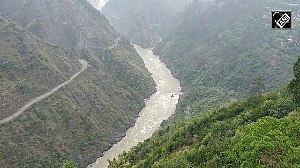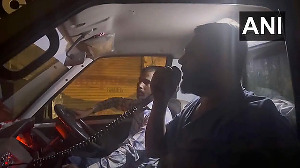On the eve of a possible government outreach for Jammu and Kashmir, BJP leader articulates his views on the issue to Sheela Bhatt
Arun Jaitley, Leader of the Opposition in the Rajya Sabha, is having one of the most productive times of his political career. A lawyer by profession, he uses his professional instincts these days in conducting his party's affairs in Parliament.
The Bharatiya Janata Party's dwindling image is partially arrested by the matured performances of Sushma Swaraj in the Lok Sabha and Jaitely in the Rajya Sabha. If not on the streets, at least on the floor of the House they are questioning the government's actions and even challenging them enough to frustrate them.
Jaitley, in an exclusive interview with rediff.com's Sheela Bhatt, spoke on many issues, criticising the government and defending his party with his trademark spin.
In the first of a two-part interview, Jaitley elaborates on his party's traditional belief on the Kashmir tangle and spells out its future position. Jaitley, whose wife Sangeeta hails from Jammu, does not like to refer to it as the 'Kashmir issue', but says it about the "issue of Jammu and Kashmir". Jaitley, expectedly, reiterates where the buck stops for Indian politicians while negotiating a settlement of the Kashmir issue.
What's your view on the recent developments in Kashmir?
Let me answer at length. I think the original mistake in relation to Jammu and Kashmir was committed immediately after Independence. Since then, Jammu and Kashmir is part of the unfinished agenda of Pakistan. The issue has emanated from Partition.
Pakistan will never be reconciled with J&K's identity as an integral part of India. I think, India made three errors in 1947. Sardar Vallabhbhai Patel handled the integration of India, except J&K. The same policy should have applied to J&K. Pandit Jawaharlal Nehru handled the process of integrating J&K. His capacity was never questioned but he was a victim of his own mindset.
Two, by accepting the proposal for a plebiscite and by going to United Nations, he allowed the J&K issue to be internationalised. Thirdly, by giving separate status also known as special status to J&K, Nehru prevented the psychological merger of J&K with the rest of India.
History must make a correct judgement on Nehruvian policy regarding J&K. The journey of last 63 years has taken them from a separate state to separatism. The political and constitutional link between the state and the rest of country has been weakened.
Unless we accept this harsh reality that -- the Nehruvian vision was faulty -- we can't prevent ourselves from making further errors. It has gone towards separatism due to wrong Indian vision at that time.
How do you view the demand for autonomy and azaadi?
There are three set of demands. First is the National Conference version which wants autonomy plus pre-1953 status. If it is translated in simple language, they want a separate constitution, separate prime minister, separate supreme court and separate election commission. They don't want the jurisdiction of India's Supreme Court and Election Commission to be extended to the state. Second, the Peoples Democratic Party wants self-rule. The PDP wants to go beyond the National Conference. They want so much autonomy that it's just short of independence. They even seek applicability of dual currency in the Valley. The third group is the separatists who talk of azaadi.
Now, in different shades the same Nehruvian mystique has been advanced that dilutes the political and constitutional link of J&K with India.
Now, what are the lessons we learnt out of it? During Independence when they created the demand for plebiscite and you (Nehru's government) created a special status, you had a faint hope that, 'may be, azaadi is a distant dream'. Since this is a weak government at the Centre, the separatists think this government can be pushed. They think 'a distant dream' is realisable. They are saying it's realisable. If by pelting stones you can achieve autonomy, then the distance between autonomy and azaadi is just a stone's throw away.
I have always seen a similarity of the issue with Stafford Cripps's mission in 1942. When Cripps offered dominion status under British rule, people criticised it but Gandhiji mockingly said that it's a post-dated cheque for Independence. I think unless the characters involved in the issue understand that this Nehruvian mindset has to go, things can't move rightly.
Forget it, azaadi is an impossibility -- no state of India can dream of it. The government should work for the further integration of J&K. Should you work for integration of the state or should you further dilute its integration? I think the current situation is a combination of Nehru's faulty mindset and the fact that the Congress doesn't have the statesmanship to stand up and say that the Nehruvian vision was faulty. Today, in this old vision has entered the pseudo-secular concept that if you keep the link between J&K and India weak, then India is secular and if you fully integrate J&K into India then that act is not secular.
What is the solution in the given situation?
There is a two-fold solution. You must strengthen the security environment and you must allow normal political activities. If you dilute the Armed Forces Special Powers Act, if you say let the army presence be withdrawn from there, if you demand that policemen who are putting their life in the firing line should face inquiries, if you want to weaken the border so that infiltration should be legitimised and if you agree to return the cantonment land, then you are giving a signal to the separatists that you can be a push-over. Then, with some more pushes, they would start believing that they can reach their ultimate goal. This is completely unacceptable situation from the Indian point of view.
This sounds fine but why don't you see the ground reality in the Valley? India is living in a globalised world. More than 60 deaths can never be accepted. The over-emphasis on security is at the base of today's problem and here you are advocating more security measures.
You will have to change the agenda in the environment where you are living. One, in this world no country negotiates its territory. The era of changing geographical boundaries is over. The (Atal Bihari) Vajpayee regime didn't have the majority to make several constitutional changes. But, one important factor which was a contribution of the Vajpayee regime, was that we stopped he internationalisation of the issue of J&K. We substituted it with cross-border terrorism. Nobody talked about 'Kashmir' in New Delhi. (The Pakistan) President Pervez Musharraf tried it in Agra and the talks failed. Your question speaks volumes of Prime Minister Manmohan Singh's Kashmir policy. This question means that we are afraid of world opinion and Kashmir is once again internationalised and nobody is talking about cross-border terrorism.






